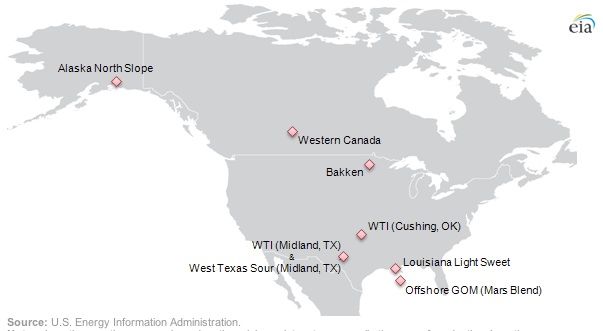RL Blogs

By Market Analyst Dan
Feb 01, 2013In honor of the Super Bowl, Refinerlink hosts the Super Oil Championship between Bakken and WCS crude oils. Which crude oil will win's this year's Super Oil Championship? |
||||||||||||||||||||||||
| It’s Super Bowl Sunday in the United States! In honor of the de facto U.S. holiday, Refinerlink hosts our first Refinerlink Super Oil Championship between two North American crude oils stars; Bakken (North Dakota) versus Western Canadian Select (Alberta).
In case you’re not one of the 100 million people expected to watch this year’s Super Bowl, here’s some background.
This game is pretty much the biggest annual sporting event in the World. Yep, I know some of you would argue that the Premier Championship or Rugby World Cup, but lets face it, 100 million television viewers are hard to top. The Super Bowl will determine this year’s NFL Champion and the Refinerlink Super Oil Championship will determine our crude oil champion!
Past champions (if Refinerlink had existed back then):
Bakken Crude Oil
The home team is Bakken crude oil, coming out of North Dakota. Bakken crude oil is extremely light at 40 API and very low sulfur at 0.2 wt% sulfur. While Bakken crude oil is light and sweet there is nothing light and sweet about its production with over 750,000 barrels per day.
Most refiners have no problems processing high volumes of Bakken crude oil due to its light and sweet characteristics. As a matter of fact Bakken crude oil is a perfect fit for topping and low conversion refineries due to its low resid yield and low sulfur content.
While its light and sweet characteristics make it a great fit for many refineries, Bakken crude oil has a few weaknesses. First, Bakken crude oil’s production in North Dakota can’t be further away from the refining centers along the West Coast, Gulf Coast, or East Coast of the United States. This is an extreme disadvantage to Bakken crude oil.
Another weakness of Bakken crude oil is one of it’s strengths, over the past two decades U.S. refiners have prided themselves on coker/sulfur capacity enhancements to accommodate the growth of medium/heavy sour crudes from the Gulf of Mexico and Latin America. Most refiners couldn’t have cared less when it came to light ends distillation capacity. This one is going to bite some refiners right in the their pocket books when it comes to processing Bakken crude oil, limiting the maximum percentage of Bakken crude oil processing.
A little know issue for some refiners that hurts Bakken crude oil is the crude oil compatibility. Depending on a refiner’s crude slate, Bakken’s solubility characteristic creates a challenge unless the refiners don’t mind their liquid crude oil turning into a solid! (Young process engineers and crude optimization analyst usually only make that mistake once!)
Western Canadian Select (WCS)
The visiting team is Western Canadian Select (WCS) from Alberta, Canada. (feel free to insert any Canadian jokes you want right here) WCS is a heavy sour crude oil at 20 API and high sulfur at 3.5 wt% sulfur. WCS is also special because it’s a mix of conventional and oil sands crude blended at Hardesty. At 250,000 barrels per day production it’s a fraction of the production of Bakken crude oil.
For many of the complex refiners along the Gulf Coast, WCS crude oil is a perfect fit to match the refinery complexity. The gravity of 20 API is right in the sweet spot in regards to refiners configured to process crude oil such as Maya.
The high sulfur content at 3.5 wt% also shouldn’t scare away many of the complex refiners. If anything, some refiners may embrace the high sulfur content due to the investments made to process high sulfur crude.
While WCS crude oil is heavy and high sulfur, it has one characteristic that coking refiners should love. WCS crude oil has very low coke content at less than 9 MCR wt%. Low coke content leads to better conversion at the coker and overall increases refining value. (This is a major deal incase you didn’t know that)
WCS crude oil is blended at the Hardesty pipeline hub, which then connects to some major refinery hubs in the Midwest and Gulf Coast. This connection to Hardesty is also a bit of a curse due to explosive production of other Canadian grades.
One characteristic that will be a deal breaker for WCS crude oil is its acid content. WCS crude oil has a Total Acid Number (TAN) of 0.9 wt%. The high acid content will keep refiners that haven’t invested in metallurgical upgrades in their crude distillation units from processing WCS crude oil.
The Match Up
Winner, Winner, Chicken Dinner to Bakken Crude Oil!!
This year’s champion is Bakken crude oil due to its production size at 3 times WCS. Market access is a bit of toss up since both crude oils are a bit isolated and location challenged. Bakken is overall an easier crude to process than WCS, which gives it a processing advantage. The only crude oil characteristic that WCS has an advantage over Bakken is in the crude oil compatibility, however that rarely drives refinery value.
Bakken crude oil wins the 2013 Refinerlink Super Oil Challenge!! But, I’d keep my eye out for WCS and the other Canadian heavy crude oil in the coming years. | ||||||||||||||||||||||||
|
Related Blogs |
||||||||||||||||||||||||
|
|










